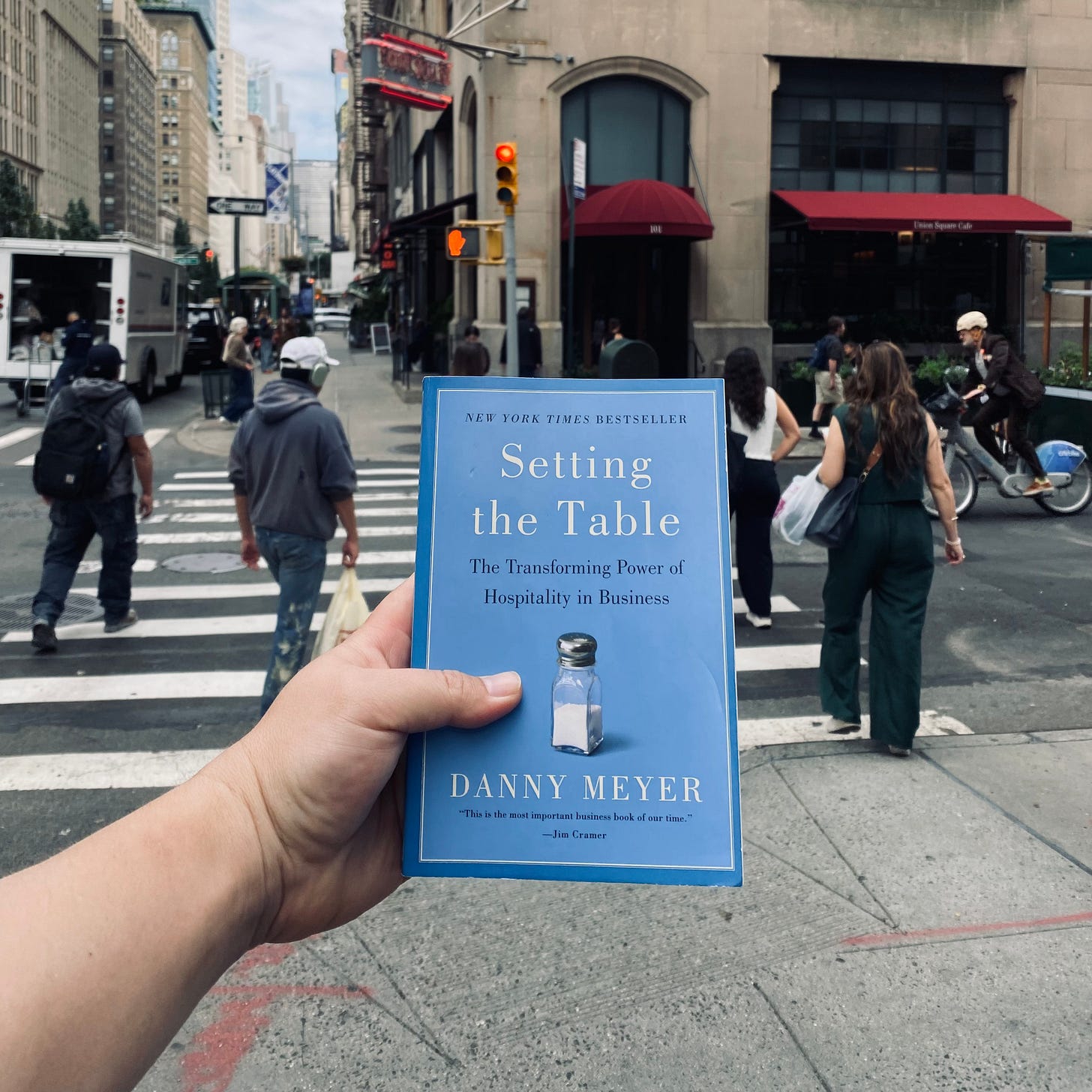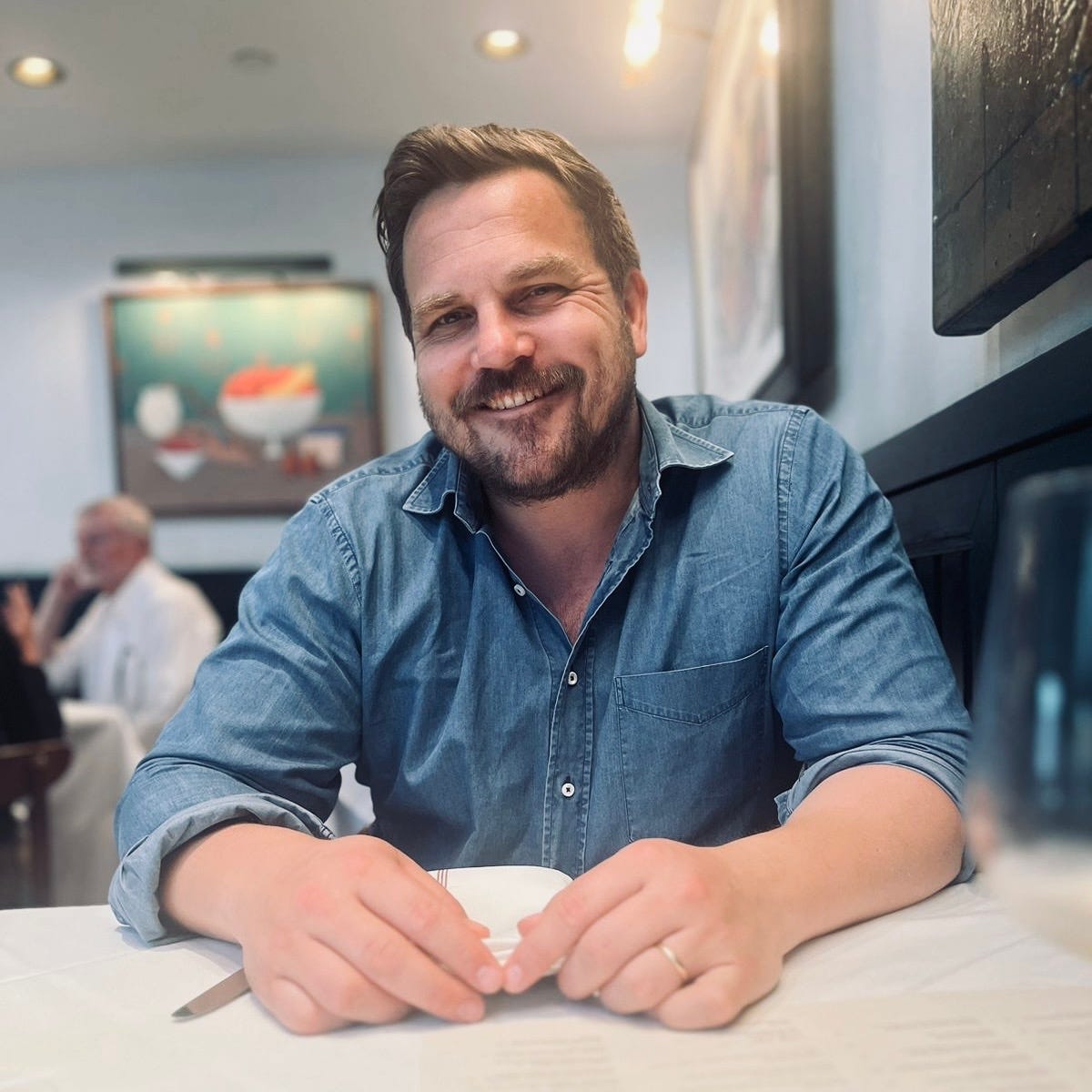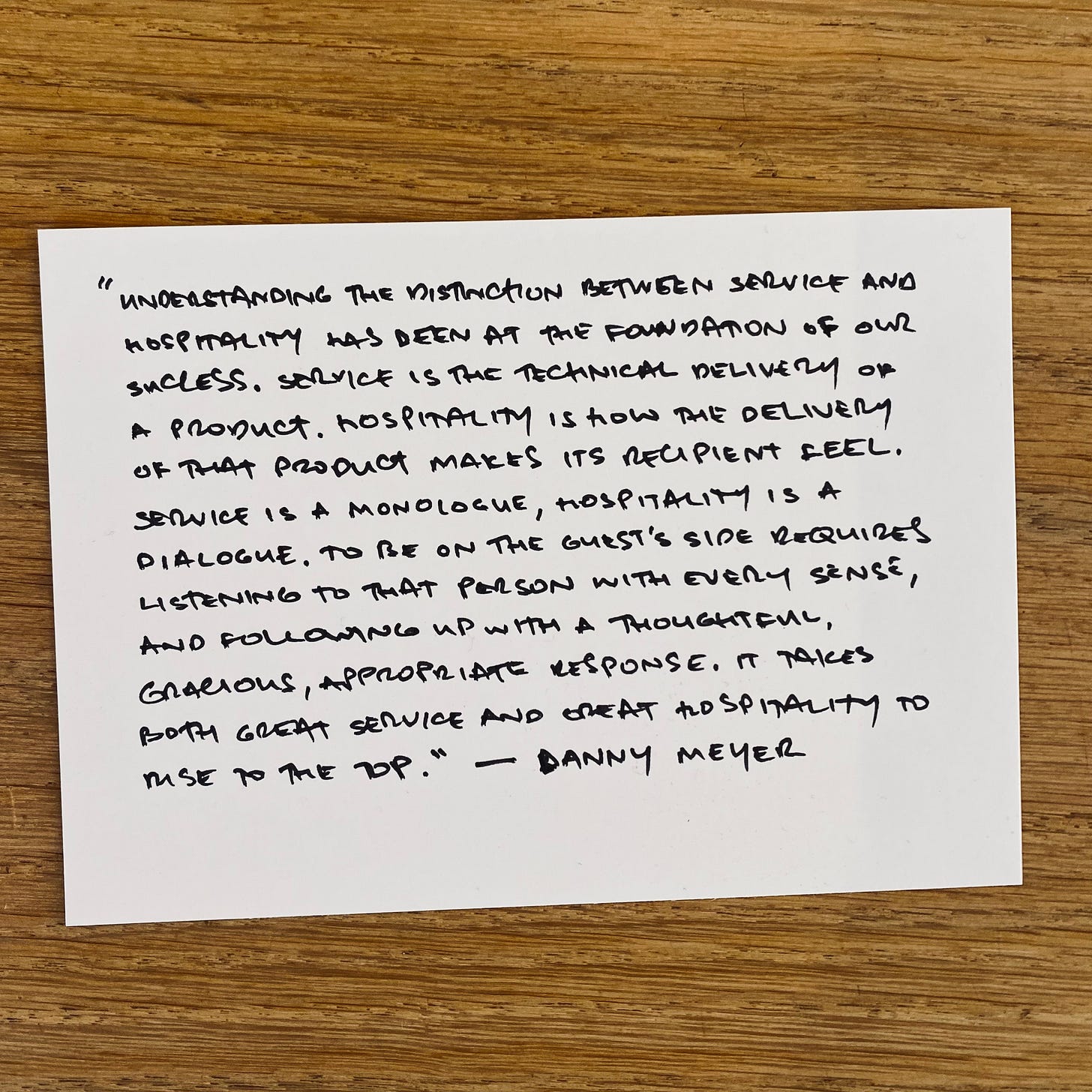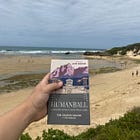Runnin’ Down A Bear
In Union Square Café
“Is there anything on our menu that was jumping out at you but you just thought, ‘No, not today…’?”
“Story of my life,” is what I wish I’d said. I felt seen, but was also stumped by our waiter, Savva. “Everything looks amazing,” I stammered, which was neither gracious nor useful. I had an inkling of what he was getting at.
We were in New York City after attending my brother-in-law Simon’s wedding on an island off the East Coast of Maine. Staying in Crown Heights with Jules’ friend from business school, we’d spent the days covering as much of Brooklyn and Manhattan by foot as possible. Thomas, our son, would turn three in a few weeks’ time and it was by far the longest spell we’d been away from him. It felt too long, and we were a long way away from Cape Town. It was our last day in New York.
I bought a copy of Danny Meyer’s Setting The Table: The Transforming Power of Hospitality in Business, a couple of days before at Books Are Magic. With it halfway devoured, and walking through The Flatiron District, I had the thought: Why not ask someone from Union Square Café to sign my copy of its founder’s book? Nothing beats a signed copy, and who ever wrote the rule that it had to be signed by the author? This sort of thing tends to embarrass Jules, but she mostly never holds me back so she waited outside.
I walked in to find an elegant woman in a floral dress at the bar picking at what I would later learn is called the 19th Street Burger. Despite the cheese and bacon burger’s presence, I still felt underdressed in this white-tablecloth-establishment. We had planned to cover a lot more ground that day and I was dressed like someone heading out for a Sunday morning dog walk.
The maître d’ lit up immediately. The request was probably not something that happened every day. She relayed my intentions to the manager who took my book to the head chef, Lena Ciardullo, for signature. While we waited, she wanted to know more about my ‘interest in Danny’, about living in South Africa and what brought us to New York. She insisted we join them for lunch. When the manager, Julie, returned with my signed book, she extended the invitation once more. I explained we didn’t have a booking and the restaurant seemed to be filling up quickly. “We’ll make a plan,” Julie said. “And we’ll make it special.”
When I walked outside Jules could tell that something was up from the look on my face. “Love, I think we have to go there for lunch today,” and I shared the details about the warmth of the interaction.
Fortunately, I had a denim shirt, trousers and veldskoen in my backpack, as we were heading to a jazz club that evening. I joked with Jules about making a quick change in a New York phone booth, but there were none to be seen. I’m not sure where I got that idea.
“We hear you are big fans of Danny,” Savva said to us shortly after we sat down for lunch. “Are you in hospitality too?” “Pretty much,” I said and I told the story about how Jules and I left our roles in corporate to start Julep, an online flower delivery business in South Africa. For over five years now, we’ve been sourcing and delivering boxes of fresh blooms with the mission of ‘Making Your Day’, but we’d never really described ourselves as being ‘in hospitality’.
Over lunch, we discussed Savva’s question further. We’d seen a company in our space that we admire often refer to themselves as ‘a technology company’. While we’ve got a polished website and solid systems, that’s something we’ve never tried on, and it feels a far cry from saying we’re in hospitality.
After watching seasons of The Bear together — the show about a restaurant and its people in Chicago, Jules and I geekily searched for the stand-up dustpan and brush they use in the show, and elevated our afternoon studio clean-ups closer to restaurant-grade. But The Bear also sparked several conversations between us about how we saw our vocations.
My standout episode of The Bear is titled ‘Forks’ in Season Two. In it, Richie does a week-long training at one of the world’s top restaurants to bring those lessons back to the restaurant they were reinventing. He spends whole days polishing forks, which at first infuriates him, but once he commits to upholding high standards, the repetition turns mesmeric, and then goes on to become one of the most likeable characters on television.
Across the table, Jules and I spoke about the challenge of wanting to build an exceptional, profitable business that will endure. The spark of bringing joy into the South African household in a way that hadn’t been done before is what attracted us to the idea in the first place. But keeping the standards high is something that gets harder to do the more people you try to reach. For both of us, even if negative feedback only comes around every thousandth order, it is still difficult to not take it to heart.
Our first and best hire ever came to us from my favourite restaurant in Johannesburg. The COVID-19 pandemic was in full flight as we were trying to get the business off the ground. When I reached out to Steve and Liza Maresch of The Local Grill, they were delighted to find some income for Bongiwe’s household. We felt a bit awkward that she didn’t entertain the idea of ever going back to The Local Grill, and she was treated like royalty by her former colleagues when we went to celebrate our first Christmas party together as a team.
We return to the same ideas with Bongiwe and the team: Just like in a restaurant, you’re only as good as the last meal you serve. On the product side, you have to always put yourself in the customer’s shoes and ask: “Would I be delighted to send this to my best friend?” and on the customer service side, we need to remain as communicative and attentive as we can.
There was something about Savva asking the question directly that forced clarity. It’s a binary answer: you either are or you are not in hospitality. And at that table, we decided that we are.
Setting The Table is a trove of ideas and concepts that underpin the enlightened hospitality philosophy of the founder of the most intriguing ensemble of restaurants I’m aware of. What started with Union Square Café forty years ago, has evolved into a panoply of some of the finest restaurants in the world, as well as spawning the renowned chain of Shake Shack restaurants.
My interest in Danny Meyer and his Union Square Hospitality Group was initially piqued after watching Bill Gurley’s brilliant talk, Runnin’ Down a Dream: How to Succeed and Thrive in a Career You Love, a couple of years ago on David Senra’s wholehearted recommendation. Gurley lists his principles that guide a fulfilling career and one of the role models for those principles is Danny Meyer.
Among the collection of artworks that could have been on loan from MoMA, and under what seemed triple-volumed ceilings, there was a vibrance that crackled through Union Square Café as the staff crossed paths with each other with a smile or a quick word. They weren’t following a script, but intuiting the needs of the customer in an optimistic and generous way. Deliberate and intentional in their actions, if Jules’ mom, Lynne was with us, she would have said, “They move like Roger Federer!”
People often say they “felt like a celebrity” when they’re treated exceptionally well, but I’m not sure that’s what I’m after as a patron. There’s something uncomfortable about the hierarchy it implies, the sense that you’re receiving treatment others aren’t. It reminds me of the old test: if someone’s nice to you but rude to the waiter, you know everything you need to know about them.
But one of Meyer’s principles is ABCD — Always Be Collecting Dots so you can Always Be Connecting Dots. That day at Union Square Café, a round of bubbly, an exceptional caviar topped potato stack, and a slice of chocolate cake for dessert all arrived at our table as ‘gifts from the restaurant’. By any definition, we received the ‘celebrity treatment’, but perhaps being the only two South Africans making the most of their last afternoon in New York earned us that bit of special attention.
The best rugby coaches in the world talk about playing ‘eyes-up rugby,’ which means you’re responsive to what’s happening in front of you rather than executing a rehearsed template. In an industry where hospitality can feel formulaic and forced, Union Square Café felt like a team that played with their eyes up: communicating, supporting, anticipating.
I waitered at the Woodlands Eatery as a student in an environment where we were encouraged to be ourselves in showing our hospitality. As I like to say: While you should never overstay your welcome, you should always feel free to stay your welcome. But I remember thinking that part of the hospitality challenge was not over-egging the pudding. You want to show up, be gracious and even entertaining, but they didn’t come out that night to be with you — so don’t get too close to pulling up a pew.
The meal ended with us saying to Savva that if he ever comes to Cape Town, as he expressed he’d like to do one day, we’d love to take him out for a meal. Which would be a story itself.
Bill Gurley’s talk shares its title with a famous Tom Petty song which is no coincidence. In its lyrics, “Yeah, runnin’ down a dream / That never would come to me”, the message is that dreams don’t come to those who sit and wait but need to be chased down. As Gurley puts it, life is a use‑or‑lose‑it proposition, and we should use it to pursue work that lights us up. The final slide of his presentation is a quote from the original Traveling Wilbury himself:
“Do something you really like and hopefully it pays the rent. As far as I’m concerned, that is success.” Tom Petty
In the Season Three finale of The Bear, Will Guidara, the co-producer and consultant to the show (who was mentored by Danny Meyer in his role as general manager of Eleven Madison Park before buying it), makes a cameo appearance and delivered the following words that resonated with both me and Jules:
The morning after my 40th birthday last month, I scrolled through Instagram and saw that Union Square Café was celebrating its 40th birthday party on the same night. Thinking about how Union Square Café has been making people feel the way that they made me feel, for as long as I’ve been alive, is a beautiful coincidence.
It made me think about what it means to me to be Runnin’ Down a Dream and pursuing work that lights me up. That there’s nobility in helping people celebrate some of their most important moments, and that doing it well can make the world a nicer place. It made me think that maybe one day we’ll celebrate Julep being in business for forty years too.
Oddly enough, I don’t think about going back to New York City half as much as I think about going back to Union Square Café for another meal.
NOTE: Bill Gurley’s book Runnin’ Down a Dream: How to Thrive in a Career You Actually Love is slated for release in February next year. I can’t wait to read it. Pre-order it HERE.
If you enjoyed this, you may also enjoy these other essays of mine:








Lots of gold here, but particularly liked the 'old test' and Tom Petty quote. Also love the idea of doing business 'eyes-up', I suppose it allows for that spontaneity and creativity needed to make people FEEL something.